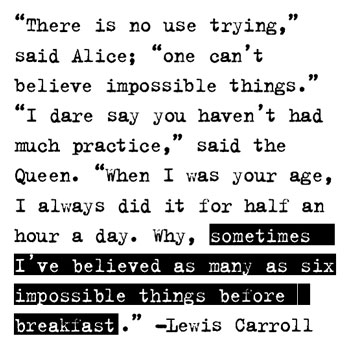Must You See To Believe? 



One is taught in school (and elsewhere) the importance of the dictum Seeing is Believing, and quite rightly so, for that dictum acts as a protective shield against the wiles and the treacheries of swindlers, sophists, punsters, and ironists. However, does it imply that if you cannot see something with your own physical eyes you should disbelieve in its existence? Consider the following list of ‘things’ : the moons of Jupiter, the thyroid gland in your own body, the duodenum of your friend, a positron, Stockholm, a string of DNA, and a neutrino. I take it that you, the reader of this blog, have not seen at least one of these entities --- I myself have not seen any of them. Why do we nevertheless believe that they exist? Perhaps we have an astronomer friend who has told us that Jupiter does have moons; or a geneticist cousin who has seen the structure of DNA with her own eyes; or a friend who spent the last summer in Stockholm; or a physicist flat-mate who has given us arguments in favour of the existence of the positron. In all these cases, we implicitly trust these people, we trust that they are not deliberately trying to mislead us, and that they have indeed seen one or the other of the above things with their own eyes.
Therefore, if we were to accept the claim Do not believe in what you have not seen with your own eyes and follow it in a rigorous and consistent manner in our lives, we would very soon pile up a list of hundreds of things in whose existence we must either disbelieve or about whose existence we must exercise a complete suspension of judgement.
At this stage of the argument, however, an interesting question comes up : how shall we know in whom to place our implicit (or even explicit) trust?
Therefore, if we were to accept the claim Do not believe in what you have not seen with your own eyes and follow it in a rigorous and consistent manner in our lives, we would very soon pile up a list of hundreds of things in whose existence we must either disbelieve or about whose existence we must exercise a complete suspension of judgement.
At this stage of the argument, however, an interesting question comes up : how shall we know in whom to place our implicit (or even explicit) trust?


7 Comments:
At 19.1.05, Anonymous said…
Anonymous said…
Wow, "Alice In Wonderland"! Cool book! It was one of my favs when I was little! :-)
At 20.1.05, Anonymous said…
Anonymous said…
Is not disbelieving always equivalent to believing?
At 20.1.05, The Transparent Ironist said…
The Transparent Ironist said…
At the formal level, believing and disbelieving move along parallel lines : whereas a believer asserts a certain proposition X, a disbeliever denies it. At the level of content, however, huge differences could emerge from this divergence. X could be : Abortion is ethical, and in this case a believer in X and a disbeliever in X will lead very different life-styles.
At 21.1.05, Anonymous said…
Anonymous said…
bla bla bla...why do u like so much to labyrrinthe in such phylosophical talks that anyway don't lead somewhere..make no progress.
At 21.1.05, The Transparent Ironist said…
The Transparent Ironist said…
Mainly because what 'progress' really is and whether or not such 'progress' is possible are themselves two vital 'philosophical' questions.
At 22.1.05, Anonymous said…
Anonymous said…
i mean...what is the point in so much talking about very obvious things...and obtaining no result..the things that u question about remain the same even after years of talking about them..philosophy is beautiful, but some philosophical talks are like turning around ur own words and ideas like a dog turning around the tail..arriving nowhere.
don't get upset on me thouh..it was just an personal idea..i still like u..very much! :) OXOX
paul
At 22.1.05, The Transparent Ironist said…
The Transparent Ironist said…
Yes, some of the questions --- What is truth? What is the meaning of life? Where are we all headed towards? What should we hope for? --- remain the same over time. Each generation, however, has to ask them over and over again, and each generation gives its own distinctive answers to these.
Post a Comment
<< Home